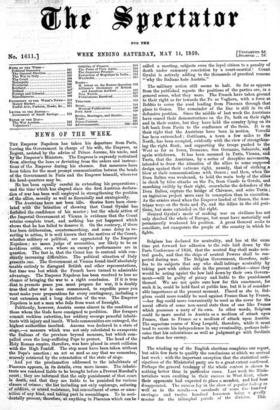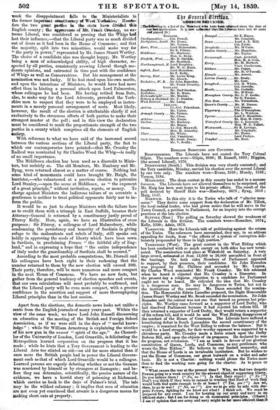The winding up of the English elections completes our report,
but adds few facts to qualify the conclusions at which we arrived last week ; with the important exception that the statistical anti- cipations of the Ministerial party are to a great extent confirmed. Perhaps the general tendenef of the whole contest is shown in nothing better than in particular cases. Last week the Minis- terialists were exalting in their success in West Kent, where their opponents had expected to place a member, and had been disappointed. The success lay in the show of popular ft-cling as well as in the results—a cavalcade of some five hundred carriages and twelve hundred horsemen being a goodly muster for the triumphal parade of the division. This week the disappointment falls to the Ministerialists in the former important eanatitueney of West York/al/ire. Hereto- fore the two great parties in the state haw) diriied dais English county ; the appearanee of Mr. Frank Ciessley, an sx- treme Liberal, was considered as proving that the Whigs hat lost their influence,—that the Liberal party was as much divided out of doors as it had been in the House of Commons ; and that the majority, split into two minorities, would make way for " the party in power," represented by Mr. James Stuart Wortley. The choice of a candidate also was thought happy, Mr. Wortley being a man of acknowledged ability, of high character, re- spected by all parties, consistently avowing Liberal though mo- derate opinions, and entrusted in time past with the confidence of Whigs as well as Conservatives. But his management at the nomination was not lucky. If he had stood upon his own merits, and upon the intentions of Ministers, he would have had more effect than in hinting a personal attack upon Lord Palmerston, Whose colleague he had been. His having retired from Bute, also, to make way for the Lord Advocate, provoked the York- shire men to suspect that they were to be employed as instru- ments in a merely personal arrangement of seats. Most likely, however, the result of the election is attributable chiefly if not exclusively to the strenuous efforts of both parties to make their strongest muster at the poll ; and in this view the declaration must be considered to mark the proportionate strength of the two parties in a county which comprises all the elements of English society.
With reference to what we have said of the increased accord between the various sections of the Liberal party, the fact to which our contemporaries have pointed—that Mr. Crossley the Radical was nominated by Sir Charles Wood the Whig—is really of no small importance.
The Middlesex election has been used as a discredit to Minis- ters, but unfairly so. The old Members, Mr. Hanbury and Mr. Byng, were returned almost as a matter of course. Nothing but some kind of monomania could have brought Mr. Haigh, the barrister,—who volunteered at a previous election to patronize Lord Stanley,—upon the scene at Middlesex, as " the exponent of a great principle," without invitation, repute, or money. To Charge against Ministers the ludicrous failure of so eccentric a gentleman is neither to treat political opponents fairly nor to in- form the public.
It would be as just to charge Ministers with the failure here as to credit them with a triumph in East Suffolk, because their Attorney-General is returned by a constituency justly proud of Fitzroy Kelly. Here, again, we have an illustration of cross purposes : Sir Fitzroy, a colleague of Lord Malmesbury, while condemning the persistency and temerity of Sardinia in giving refuge to the malcontents and rebels of Italy, still speaks out boldly in approving the seeds of libertv which have been sown in Sardinia, in proclaiming France "'the faithful ally of Eng- land," and in expressing a hope that " the entire independence of Italy under the guardianship of Sardinia shall be secured."
According to the most probable computations, Mr. Disraeli and his colleagues have been right in their reckoning that the number returned to them by the new election will exceed 300. Their party, therefore, will be more numerous and more compact in the next House of Commons. We have no new facts, but gather from the general tendency of election speeches and events, that our own calculations will most probably be confirmed, and that the Liberal party will be even more compact, with a greater confidence in the assertion and support of more thoroughgoing Liberal principles than in the last session.



























